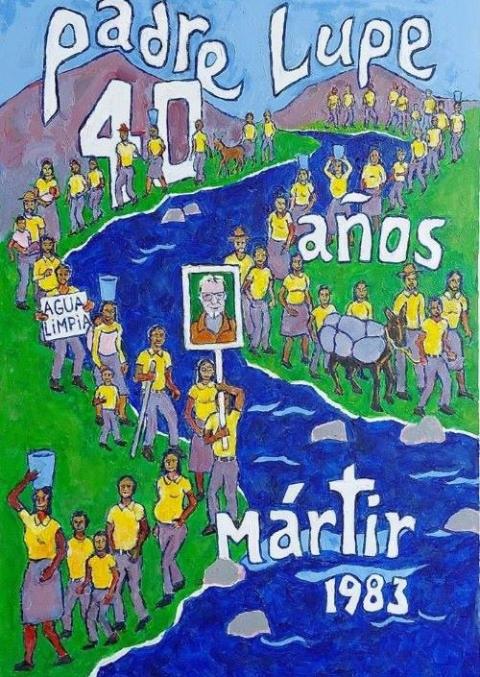
The Guapinol River trickles down the Carlos Escaleras National Park. About a decade ago, Inversiones Los Pinares received approval to build an iron oxide mine in the park. (SHARE Foundation/Mark Coplan)
In September, I joined a delegation to Honduras with the SHARE Foundation to honor and celebrate the life of the Jesuit martyr James Carney. He is known to the Hondurans as Padre Guadalupe, a priest who accompanied the campesinos as they struggled for human rights in their homeland. Shortly after his disappearance in September 1983, I learned about Padre Guadalupe in a class taught by his sister and brother-in-law, Drs. Eileen and Joe Connolly. They shared the details of their brother's life and recent disappearance. Forty years later, I continue to be deeply troubled by the evidence they presented.
Padre Carney had become a Honduran citizen, but in 1979 he was expelled because of his solidarity with the campesinos who were struggling for agrarian reform. His deep commitment to human rights, particularly the right to own land and access clean water, made him a target of the government. He sought refuge in Nicaragua, where he hid chapters of his book, To Be a Revolutionary: An Autobiography, in many safe deposit boxes throughout the country. He told his family that he wanted the truth to be told about the struggles, suffering and deaths of the people. The proceeds from the book were intended to benefit the people of Honduras.

This illustration by Jesuit Fr. Mark George highlights the 40th anniversary of the disappearance of Jesuit Fr, James Carney in Honduras. (Mark George)
The Connollys reported that someone tried to break into their hotel room through the ceiling to investigate the information they had been gathering. I recall Joe holding a binder full of documentation of their investigation to determine the whereabouts of their brother. The family had received four different reports of possibilities, but no definitive answers.
Both the Honduran and U.S. foreign affairs files include numerous redacted documents. Despite four lawsuits filed under the Freedom of Information Act, allegations regarding U.S. involvement in Latin America, and President Bill Clinton's promise to inquire into previous administrations' data, the truth has not been revealed.
As I reflect on my firsthand experiences in Honduras, two words keep echoing in my being: La Lucha, "the struggle."
After the Honduran revolution, the people who were held in internment camps were given personal land to cultivate for their livelihood. Most of them built humble homes and planted banana trees. However, their land is now being claimed by large corporations who purchased a magnitude of land to grow palm trees to sell palm oil. The campesinos have lost their rightful land ownership. They are displaced and their crops are gone.

Josephite Sr. Sharon White stands with local water defenders of the Río Guapinol in the Bajo Aguán valley, Tocoa, Honduras, Sept. 13. (Stephanie Spandl)
I walked with the Hondurans and witnessed the degradation of land due to illegal mining activities. We climbed a mountain and swam in a beautiful clean waterfall. After descending, we rode four tributaries of filthy brown water. The Los Pinares Mining Company has destroyed the clean water while mining for iron ore.
Without land and water, there is no life! Padre Carney was a protector of life. He is one of thousands of campesinos who have been in solidarity in the struggle to defend the human right to land and water. The truth is that these campesinos, these water defenders and their families, do not want to migrate. In their attempts to resist government, military, police and mining company security guards, they have been jailed, displaced, and many have been murdered.
The SHARE Foundation has been instrumental in encouraging 29 U.S. congressional representatives to sign a letter to Secretary of State Antony Blinken urging him to investigate the illegal mining in Honduras. Moreover, the U.S. ambassador to Honduras, Laura Dogu, whom we addressed while in Honduras, must pressure and strongly and more clearly voice solidarity with the struggle of the people and be less aligned with international mining interests.
My soul is restless.

José Artiga, the director of the Share Foundation, pauses for a blessing from Josephite Sr. Sharon White as he departed the airport in Honduras. (Stephanie Spandl)
The importance of addressing land and water issues is not limited to Honduras; it reflects a global reality. As I returned to the East Coast of the United States and shared my concerns, I have found that people are making efforts to listen and understand my personal struggles. However, I am not totally convinced that we really recognize the need to embrace a radical sense of mission, particularly among voices that are outraged by the harm and degradation of our sacred planet.
Pope Francis has consistently called the world to address climate change. Creation Spirituality beckons us to hold all of life sacred, humans as well as all that encompasses our universe. I acknowledge that it can be difficult for us to imagine what we have not seen.
How can we sing with one voice if we lack an understanding of the true realities, which are not only present in Central America, but also right here at our doorstep? How many hurricanes, floods, fires and earthquakes will it take before we experience a metanoia, a radical change of heart?
As a result of my travels and studies, I have come to realize I am angry. I am angry about global climate change and our failure to pay attention to genuine, cohesive and dramatic change. It will take more than my voice to change the world.
Advertisement
With my fellow delegation members, the Honduran people, and all people of goodwill, I offer this prayer for all of us, no matter what issue you may be struggling with:
"Let my heart be restless O Lord, until it rests in you" (St. Augustine). When Justice calls and demands to be heard, remember, el silencio es un pecado. (Silence is a sin.) Like Padre Guadalupe, the hope and faith of a people who willingly continue the struggle calls me to be restless until all of God's people can vibrantly live in this world. Amen
We are all campesinos — we are all amongst the poorest of the poor when our souls are restless. In that restlessness, we find the heart of God moving within us, calling us to a new place that demands everything from us in order to find the new.
Stay restless. Hear your calling. Move with the Spirit as you encounter others, new restless souls
with whom to form community. The issue may matter to those it matters to, yet is also not the only thing that matters. What truly matters is staying focused on the restlessness and finding a communal outlet for our desire for a new Eden.




